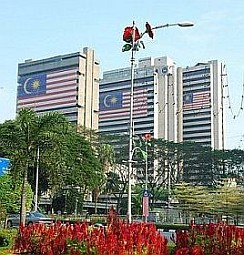 |
|
| Central Bank of Malaysia headquarters |

Bank Negara Malaysia (BNM) is the Central Bank of Malaysia established on January 26, 1959 under the Central Bank of Malaysia Act 1958. Bank Negara had previously maintained branches in each of the state capitals. Most of them were closed in the 1990s when retail banks began taking over most of the counter services. There are still branches in Kuching, Kuala Terengganu, Penang, Shah Alam, Johor Bahru, Kota Kinabalu, Kuching and Kuala Terengganu. Bank Negara also has representative offices in London and New York.
Objectives of Bank Negara Malaysia
• To promote monetary stability and a sound financial structure
• To act as a banker and financial adviser to the Government
• To issue currency and keep reserves safeguarding the value of the currency
• To influence the credit situation to the advantage of the country
Over the years, the roles and responsibilities of Bank Negara Malaysia have evolved and expanded. Today, Bank Negara Malaysia focuses on the three pillars of central banking, namely monetary stability, financial stability and the payments system. In addition, importance is given to the developmental role of Bank Negara Malaysia, in respect to economic management, institutional building and the development of the financial system.
Why is monetary stability so important?
It is important because when there is monetary instability, prices are either rising (inflation) or falling (deflation) and this can result in distortions and undermine the long-term economic growth prospects of the country. If inflation is too high, people will be concerned about the purchasing power of their money balances. This would result in a greater demand for real assets like houses and properties, which are thought to be more "inflation-proof". There would be less interest to invest in productive capacity of the economy. Similarly, savers would be less inclined to hold savings in the financial system if they expect that the value of their savings would be diminished. Fixed income earners will find that they are able to buy less goods and services and will experience a reduction in their standard of living. High inflation would also make exports more expensive to foreigners and this would reduce the competitiveness of the exports. Persistently high inflation would therefore reduce the growth potential of the economy.
BNM head office address:
Jalan Dato' Onn
P.O. Box 10922
50929 Kuala Lumpur
Phone: 603-2698-8044
Fax: 603-2691-2990
Internet: www.bnm.gov.my
